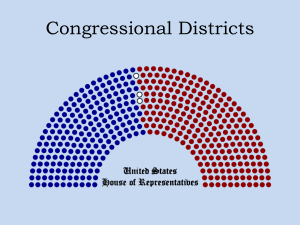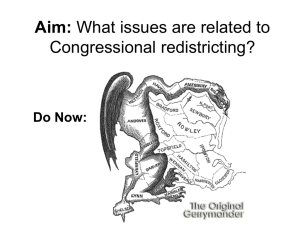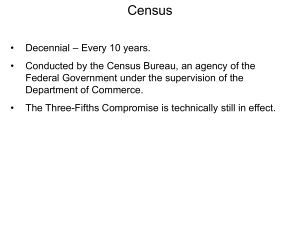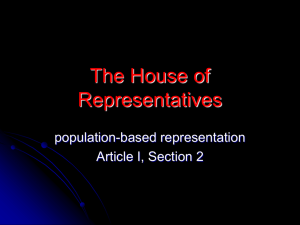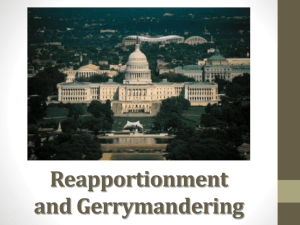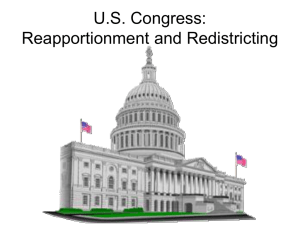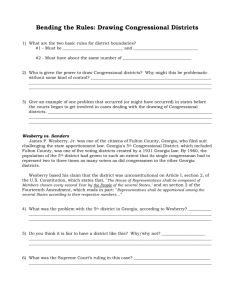Congressional Reapportionment
advertisement
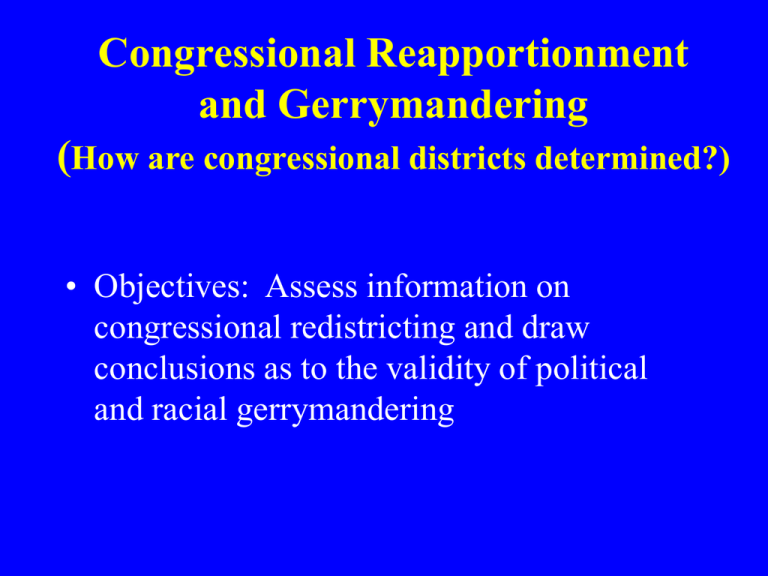
Congressional Reapportionment and Gerrymandering (How are congressional districts determined?) • Objectives: Assess information on congressional redistricting and draw conclusions as to the validity of political and racial gerrymandering Congressional Reapportionment and Redistricting House of Reps & Electoral College determined by Federal process: Reapportionment Congress decides number Representatives per state after each Census • Redistricting: State legislatures decide shape and size of districts Changes After 2000 Census Redistricting by State Legislatures • • • • Malapportionment: Wesberry v. Sanders (1964) “One person, One Vote” Question: Should the size of the House be expanded? • Gerrymandering: • Courts usually decline to strike down gerrymandered districts, unless they violate the Voting Rights Act. • Questions: – Is this the best way to create Congressional districts? – What other ways might be used to create Congressional districts? District drawn by Gov. Gerry of MA in 1812 to benefit his party Why is gerrymandering so effective? Optional Assignment (12 pts.) Play the Redistricting Game and answer questions from the handout on my website. • Examples: If the state legislature was Republican… • 1. Concentrate all Democrats into only a few districts Spread Democrats as thinly as possible over several districts Throw two Democratic Members of Congress together into the same district 1. Democrats will win those districts, but nowhere else. 2. 3. Results: 2. Democrats won’t be able to win anywhere. 3. Only one of the Democratic incumbents will be reelected. History of Majority-Minority Districts • Definition of Majority-Minority Districts: districts drawn to give African Americans, or other minority groups, a chance to elect representatives • What is the Controversy? • Should any districts be shaped on basis of race? • Is it discrimination, in violation of the 14th Amendment of the U.S. Constitution? History of Voting Rights • 14th Amendment Equal Protection clause (1868): “No state shall make or enforce any law which shall deny to any person within its jurisdiction the equal protection of the laws.” • 15th Amendment (1870): “The right of citizens of the United State to vote shall not be denied . . . . on account of race…” Selma to Montgomery March, 1965 • Civil Rights movement • 1965 Voting Rights Act – federal gov. oversight of states with history of discrimination • 1982 Amendments – fed. gov. encouraged states to draw majorityminority districts • 1990 Census – states redrew districts, some with odd shapes Lyndon Johnson signs Voting Rights Act Supreme Court Decisions • Shaw v. Reno (1993)(5 to 4): • Race may be a factor in drawing bizarrely-shaped districts only if it serves a “compelling governmental interest” • Court struck down NC’s majority-minority district, saying there was no “compelling governmental interest” • QUESTION: Do you agree or disagree with this decision? Was there a compelling governmental interest? • Miller v. Johnson (1995)(5 to 4): Struck down GA district: Race may not be a “predominant factor” • Hunt v. Cromartie (2001)(5 to 4): Upheld NC district, Race may be one of many factors • Race was not proven to be the “predominant factor” in drawing the district. Burden of proof is on plaintiff. Racial GerrymanderingMajority-Minority Districts Should majority-minority districts be permitted in order to give African Americans a greater chance to select members of Congress? • Write/Share: • List as many Pros and Cons as you can brainstorm • Your opinion? Selma to Montgomery March for Voting Rights, 1965 Closure: Review of Arguments • Race OK as Factor • Goal of 14th Amt: improve protections of minorities • Compelling interest in remedying history of voting discrimination • Compelling interest in diverse House of Representatives • Minorities have long been underrepresented in Congress – Voters tend to vote for people of own race (“bloc voting”) – E.g. Only 5 African American Senators since Reconstruction – Compelling interest in getting minorities elected? • Guard against tyranny of majority • Forbid Race as Factor • Goal of 14th Amt: equal treatment for all • Blank slate • Distinctions based on race foster racial hostilities & stigmatize minorities • Stereotype to assume all people of a racial group share same views • Concentrating minority votes in a few districts may decrease their influence • Majority-minority districts hurt the Democratic party? Two Theories on Representation • Descriptive Representation - demographics of legislature should resemble those of constituents • Substantive Representation - opinions of representatives should represent those of constituents • What is your opinion on this issue? • Is there value in having a diverse Congress? • Might people of color feel differently than whites on this issue? Why?
